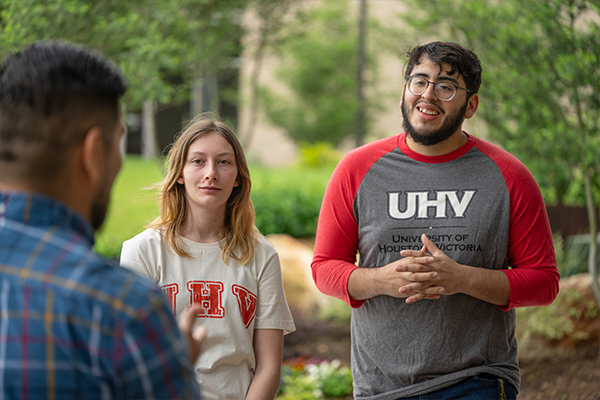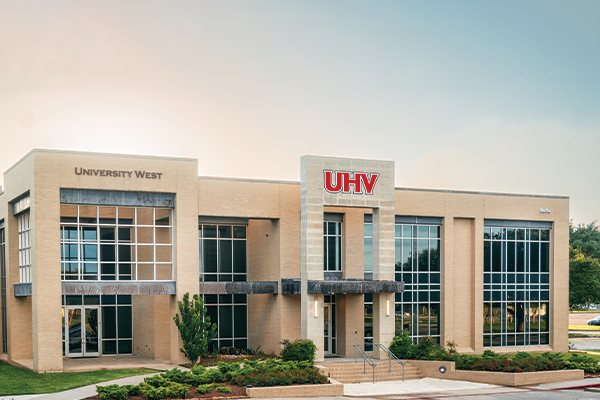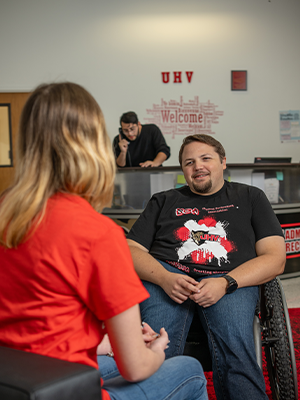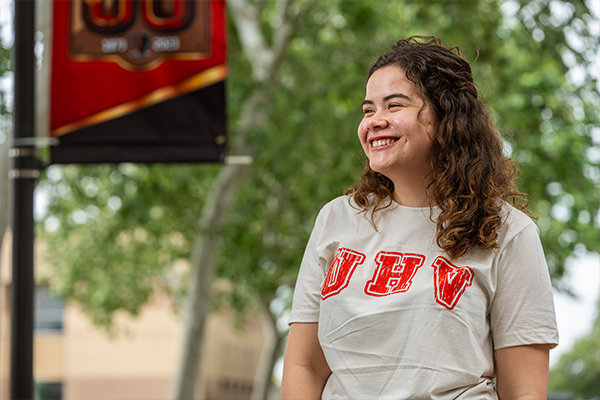Introduction
UHV values your interest in our students and our internship program. These opportunities allow employers to showcase their company to students and assess if a candidate could be a good fit for future roles. For our students, these internships are crucial, offering essential experience and aiding in their professional growth.

Opportunity Definitions
Careful consideration of the type of experience that you plan to offer is the first step. Our office facilitates
relationships between employers and students for job shadowing, employment, and internships. The following are
the definitions and basics of the opportunities that we help coordinate and who can take advantage of them.
Please note, opportunities other than internships will have some information here, but many require a separate
affiliation or contract agreement. If you are interested in the other programs, you can contact the Career
Development Center for more information.
Externship Opportunities
The Jaguar Career Externship program is a short-term coordinated job shadowing program. Students are paired
with organizational representatives in a career the student is considering or wants to learn more about. Our extern
program is designed to introduce students to professional agencies and to learn more about career journeys and
options. The program only requires an investment of time. Generally, students only shadow a few days. Any type of company or profession would be welcome. If you would be interested in hosting a student extern, contact the
Career Development Center for details.

Volunteer Opportunities
Volunteer opportunities can be short or long-term experiences for students. Volunteer opportunities do not require an investment from the employer, and any requirements are determined by the employer. These experiences are valuable opportunities to gain experience without formal time commitments for the student or formal compensation commitments for the employer.
The Career Development Center will list volunteer opportunities only for government agencies, educational institutions, and nonprofit organizations. Employers with volunteer opportunities can also contact our Community Engagement Coordinator.
Part-Time Jobs
Many opportunities for our students fall into this category. A part-time job requires no formal training in a specific field, and work will usually be expected to be ongoing on a set schedule requiring no more than 25 hours a week. Part-time jobs require compensation at a rate that complies with federal wage laws and are supported by the job description or employer pay scale.
Work Study Program
The Texas Work Study Program and the Federal Work Study Programs are designed to help students who have additional financial need after scholarships and grants are factored. Employers can contract with the university to host work study students at their site. Students hired for off-campus work study report to the employer, but they are paid by the university. Employers are billed at the end of the semester for the non-federal or state share of the students’ work study earnings plus any payroll-related liabilities.
Reimbursement rates are determined by the organization type. Nonprofit, educational, and government agencies can expect to pay 0-30 percent based on the job performed. For-profit businesses can also contract with the university for work study for major-specific positions. For example, you can have an accounting student help with your billing or finance department. Reimbursement rates for businesses in this category are 50 percent. Be aware that it can be a longer search for the candidate in a specific major and who has remaining financial need, so patience is encouraged.
You can find out more about the Work Study Program requirements or initiating a contract by contacting the Career Development Center or the Office of Financial Aid.
Internships – Experience Only

Internships that are for experience only are designed for upper-division students (juniors and seniors) in a particular field. Experience-only internships should have learning objectives included in the description and generally do not exceed one semester. Faculty approval is not required for this type of internship. Evaluations are requested for student experience record keeping, but formal employment evaluations are not required.
Internships – Academic Credit
An internship for academic credit is a short-term experience which generally corresponds with a regular semester. The opportunities are designed for upper-division and graduate students to earn experience in their field and to work on other skills such as teamwork and problem-solving in a professional environment. An internship can also help students clarify their career goals and begin to develop a professional network. The job description should have learning objectives and will require faculty approval for students to receive credit. Internship for credit can be paid or unpaid. However, the Career Development Center will only post unpaid internships for government agencies, educational institutions, and nonprofit organizations.
CPT – International Students

Curricular Practical Training (CPT) is designed to allow international students with a F-1 visa type to participate in paid internships that align with their academic career goals. CPT provides temporary authorization to work in the United States in roles that provide them with valuable work experience as well as credit for the degree plan. Additional planning time is recommended if international students are under consideration. Extra time before the start date will ensure that the student has adequate time to process the request for work authorization.
We encourage employers to consider opening internship applications to those who are CPT eligible. International students can bring unique insights and perspectives that can help your business.
The University of Houston-Victoria is happy to partner with employers for any of the opportunities listed above.
Employers interested in hiring students are welcome to contact the Career Development Center at (361)570-4385, and we will be happy to provide you with the process or requirements.
Internships
The Career Development Center encourages students to participate in internships. Internships provide real work experience that will be valuable to a student’s post-graduate career success. Internships offer numerous benefits to both employers and students.

Benefits of Internship Programs
For Employers
- Internships provide a continuous pool of qualified students to recruit.
- Internships serve as a low-cost training and development program.
- Student interns make great brand ambassadors for your organization.
- Interns can improve the productivity of regular employees.
- Student interns can bring a fresh perspective and new ideas.
- Interns that are later converted to full-time hires are retained at a higher rate.

For Students
- Students gain an understanding of different career paths.
- Interns develop professional skills that they will need for post-graduate success.
- Internship experience makes students better candidates for future employment.
- Students gain the opportunity to network with professionals in their field.
- Interns hired after an internship express greater job satisfaction, which can positively affect retention.
Unpaid Internships
The National Association of Colleges and Employers (NACE, 2024) has released a position paper calling for an end to unpaid internships. It is difficult for many students to complete an unpaid internship and pay for the class. Because internships are an avenue for company recruitment, the inability to participate in internships is detrimental to student success. Furthermore, the Bureau of Wage and Labor are scrutinizing unpaid internships to make sure they meet criteria that demonstrate the student is in a learning role and not doing the work of a standard employee. It is very difficult for most for-profit agencies to qualify under the Department of Labor Standards.
The Career Development Center at the University of Houston-Victoria agrees with the NACE position. Therefore, we will only post unpaid internships for nonprofit organizations, educational institutions, and government agencies.
Some state agencies help employers offset the cost of paid internships. If you are interested in interns but are concerned about pay, contact the Career Development Center for information on programs which will help subsidize internships.
Internship Requirements
The University of Houston-Victoria utilizes the standards for internships as suggested by the National Association of Colleges and Universities (NACE, 2011). In order for an internship to be considered for credit, it must comply with the following criteria:
- The experience must provide a learning experience that is an extension of the coursework. Students should apply concepts they learned in classes in their work.
- There must be a defined beginning and end date for the internship. Interns must complete 140 hours of work at the site during the semester to receive 3 credit hours, the equivalent of one class. This equates to approximately 10 hours a week during a fall or spring semester and approximately 15 hours a week during summer semesters.
- There must be clearly defined learning objectives/goals. Learning objectives and goals should relate to the student’s field of study and align with his or her academic coursework.
- Professional supervision should be provided by an agency representative with expertise and experience in that field.
- The supervisor shall give routine feedback to the students and a formal evaluation at the internship's end.
- The employer must provide any needed resources, equipment, and facilities to support the learning objectives of the intern.
- The experience cannot be in a private residence unless the student is working remotely in their own home.
Internships can be part-time employment if the student is paid like other employees, and the work is new to them.
The prime difference will be the educational element. A part-time job will not require the reporting and supervision
requirements of an internship. It is not uncommon for a student to start as an intern and continue as a part-time
employee after the internship term has ended.

Developing an Internship Program
Planning is critical for an internship program to be successful for both the student and the employer. There are
several things that you should think about when planning to start an internship program.
Remote Internships
Many companies are discovering the benefit of continuing to offer remote internships following the pandemic.
Remote internships can be just as beneficial for both the employer and student if they are well developed and
incorporate the same elements of an on-site internship. It is important to make sure a remote intern feels a part
of an organization. Inclusion is important in all internships but is harder to establish and maintain remotely. If you
decide that remote is the best option for you, make sure you have regular check-ins and virtual meetings with
your interns.
UHV Internship Process
The following discusses all the required elements and procedures for starting an internship program with
University of Houston-Victoria students.
Time Frame
An internship for academic credit generally corresponds to our academic calendar. Students can participate in
internships during our regular 16-week semester for fall (late August through early December) and spring (mid-
January through early May) or for a shorter 10-week summer semester (June through August). Aligning with the
academic calendar is recommended, so the cost of the internship class can be factored in with student course
fees and tuition.
Ideally, internship opportunities should be posted two months prior to the start date to allow adequate time for the Career Development Center and faculty to advertise the position and gather applications. For a spring internship,
the job posting would need to be available by October or early November at the latest. Be sure to plan accordingly.
Recommended deadlines:
- June 1 – Fall Semester
- October 1 – Spring Semester
- March 1 – Summer Semester
Coordinating with us by these dates will ensure that the process goes smoothly for you to acquire an intern by the
start of the desired semester. We can and will post internships that are submitted later than this deadline; however, the closer it gets to a semester start, the harder it will be to find student candidates.

Internships – Experience Only

The first step in coordinating with our institution for internships is to provide a job description. The job description
should have details of the duties and requirements for the student intern. Job descriptions are sent to the faculty
supervisor for the student’s program of study for evaluation. Faculty are looking to determine if the job is adequate in difficulty and the amount of work to be the equivalent to a student participating in a 3-credit-hour course. Details are important. Declined job descriptions can either be posted as a part-time job, or the Career Development Center can work with you to revise the job description if needed.
Approved job descriptions are then posted in our electronic job board for students to apply. The Career Development Center is happy to serve as a clearinghouse for student applications to ensure that the students who apply are qualified. However, it is at the employer’s discretion. If the job has all the required elements, the posting should be visible only to students in the correct classifications and majors.
Candidates will only be checked to see if they qualify under their academic program criteria. The Career Center
cannot serve as a reference for all students. We can only speak to a student’s interactions with our office. We will
only serve as a reference for the students who are Career Development Center employees.
Organization Forms or Criteria
Any additional requirements of interns should be made known to the university representatives. Is there specific
training the intern will need? Do you do a criminal background check that the student must pay for? Make sure the Career Development Center knows everything that will be needed, so they can prepare the student appropriately.
Affiliation Agreement
An affiliation agreement between the hiring organization and the university is required for an internship for credit.
The university has a general form that would be appropriate for an organization that wants interns from any of our
colleges. There are also agreements specific to a certain program; however, these are largely for graduate level students.
Employers can use a contract form established by their agency. An employer-provided contract must be submitted to the UH System legal department for approval before execution. Contract reviews will take an additional two to three weeks, so early planning is essential.
Supervision and Reporting
The on-site student supervisor will be responsible for working with the faculty on learning objectives for the students and providing reports on the student progress. Requirements may vary based on academic programs. Some faculty will have periodic discussions with an employer and an end of semester evaluation that must be completed. Others may want a more formal report. Should an employer host students from more than one college during the same semester, we will work to make sure that reporting is consistent to ensure a smooth process.

Selecting Your Intern

Intern recruitment should closely mimic the organization's process for hiring long-term employees. Employers should evaluate submitted resumes for critical skills and competencies. Candidates should then be interviewed either face-to-face or by phone; it is important to interview candidates. It is a critical step that will help confirm the selection process and provide valuable interviewing experience for the potential intern. Internship success is dependent on a solid match between the company and the intern's abilities. The employer’s responsibility when recruiting a future affiliate of the organization should mainly consist of looking for the skills and course content needed to be successful in that role.
Managing your Intern
To ensure student success in the role, it is helpful to have an orientation with the student
in the beginning. The orientation should include:
- Clear discussion of expectations and assignments
- Introduction to team members and mentors
- Discussion regarding rules or legal requirements that govern the work
- Review of company policies and procedures
- Tour of the facility with introductions
- Discussion of how their work will be evaluated
- Opportunities to ask questions
It is important that interns also have an opportunity to see professionals in action. Try to include them in meetings, presentations, and client appointments if appropriate.
Most importantly, remember this is a training job. While student interns will have some exposure to the concepts and practices used in the internship, many may have limited or no work experience and may need more guidance in professionalism and persistence. Be patient with them. They are still learning, and the internship will be an important piece to help them connect schoolwork to the professional world.

Employment Issues

For many of our students, the internship may be their first job. A first job in a professional setting can be a bit daunting, especially for younger students. While we do our best to assure that any student approved for an internship is academically prepared, we cannot guarantee that they will be a perfect employee. Employers that have an issue with an intern’s professionalism should discuss the issue with the student and inform the Career Development Center or supervising faculty, so we may offer our guidance to the student as well.
Interns are expected to abide by the same policies and procedures as other employees. Interns that commit a serious breach of workplace conduct can be let go. We do ask that you notify the Career Development Center and the supervising faculty as soon as possible, especially if the student is enrolled in an internship course.
READY TO JOIN JAXNATION?
Explore your options.




